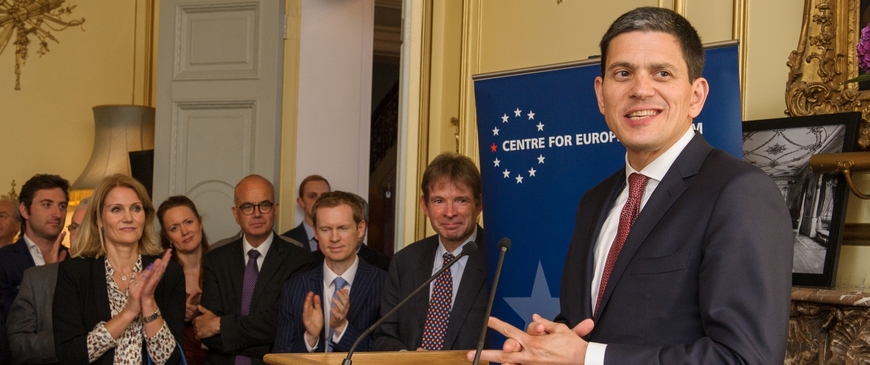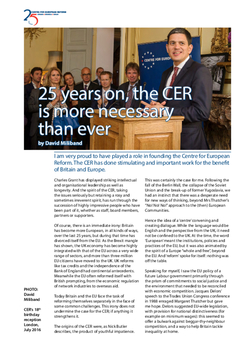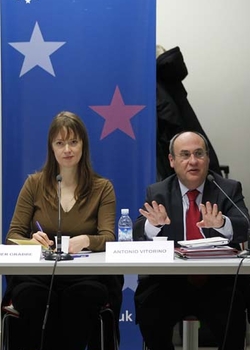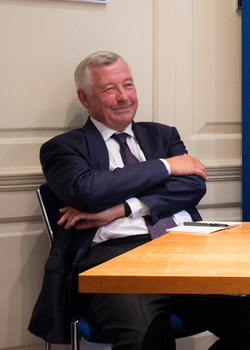
25 years on, the CER is more necessary than ever
I am very proud to have played a role in founding the Centre for European Reform. The CER has done stimulating and important work for the benefit of Britain and Europe.
Charles Grant has displayed striking intellectual and organisational leadership as well as longevity. And the spirit of the CER, taking the issues seriously but retaining a rosy and sometimes irreverent spirit, has run through the succession of highly impressive people who have been part of it, whether as staff, board members, partners or supporters.
Of course, there is an immediate irony: Britain has become more European, in all kinds of ways, over the last 25 years, but during that time has divorced itself from the EU. As the Brexit mangle has shown, the UK economy has become highly integrated with that of the EU across a very wide range of sectors, and more than three million EU citizens have moved to the UK. UK reforms like tax credits and the independence of the Bank of England had continental antecedents. Meanwhile the EU often reformed itself with British prompting, from the economic regulation of network industries to overseas aid.
Today Britain and the EU face the task of reforming themselves separately in the face of some common challenges. This irony does not undermine the case for the CER; if anything it strengthens it.
The origins of the CER were, as Nick Butler describes, the product of youthful impatience. This was certainly the case for me. Following the fall of the Berlin Wall, the collapse of the Soviet Union and the break-up of former Yugoslavia, we had an instinct that there was a desperate need for new ways of thinking, beyond Mrs Thatcher’s “No! No! No!” approach to the (then) European Communities.
Hence the idea of a ‘centre’ convening and creating dialogue. While the language would be English and the perspective from the UK, it need not be confined to the UK. At the time, the word ‘European’ meant the institutions, policies and practices of the EU, but it was also animated by the spirit of a Europe “whole and free”, beyond the EU. And ‘reform’ spoke for itself: nothing was off the table.
Speaking for myself, I saw the EU policy of a future Labour government primarily through the prism of commitments to social justice and the environment that needed to be reconciled with economic competition. Jacques Delors’ speech to the Trades Union Congress conference in 1988 enraged Margaret Thatcher but gave me hope. Delors suggested EU-wide legislation, with provision for national distinctiveness (for example on minimum wages): this seemed to offer a bulwark against beggar-thy-neighbour competition, and a way to help Britain tackle inequality at home.
The geopolitical outlook was less clear at the time. The idea of a world order with three major regulatory powers – the US, EU and China – had not yet come into clear view. So it is interesting that today it is geopolitics that is so clearly driving the big thinking about the identity and role of the EU.
The CER has built on its early strengths in economics, enlargement and EU institutions to become a thought leader in areas like the environment, justice and home affairs, foreign policy and technology. This speaks to an important element that bound us together as Europeans from the beginning: the European institutions and treaties have always had economics at their heart, but they were always about more than that. It is maddening to be told that this is some kind of secret plot against the UK, when the UK has been instrumental in promoting this fundamental bit of common sense.
This sense of connection between economics and the wider society is what the rise of stakeholder capitalism represents. I think it is an important part of the identity of the CER and all European countries. It is the social market economy in action, where the business of business is not just profit. And the welfare state, for example in respect of childcare and family policy (admittedly to varying degrees) is designed to support economic as well as social goals. Having lived in the US for nearly a decade, I can tell the difference it makes.
Today, with the UK outside the EU for the foreseeable future, we would benefit from a debate about ‘European’ reform that retained the dual perspective that was core to the founding of the CER: reforming EU institutions in a way that prepares the Union for external challenges, while engaging those outside it. This is where the debate about ‘strategic autonomy’, which is about establishing agency in an interdependent world, gains its strength and finds its challenges. It is also where questions that can seem arcane, such as the institutional debate about ‘concentric circles’, take on real meaning, because they organise power for political, economic and social ends.
The war in Ukraine should have made clear the myopia of excluding foreign and defence policy co-operation from the post-Brexit UK-EU relationship, and of almost entirely excluding the EU from the UK’s March 2021 integrated review of security, defence, development and foreign policy. Security is now the area where the case for engagement seems least controversial. Geography does not bend to politics. And threats thrive on political division.
A year after Russia’s invasion of Ukraine, three years after the outbreak of Covid, nearly seven years after the Brexit vote, and 15 years after the financial crisis, I am struck that the EU looks messier but stronger. Form does not fully follow function, but on the big issues that define prosperity and security, and notably on questions that revolve around regulation, such as the environment and privacy, but also economics and finance, the EU has taken major strides towards becoming a serious global player in the decades ahead.
I still believe that for Britain, the EU can be an economic and political anchor, even when we are outside. We need the EU to be united and strong enough to have high-functioning relations with a country like the UK.
That is going to take some thinking, as well as some leadership, in politics and beyond. The October 2022 US National Security Strategy identified two trends of rupture in international relations: the end of the post-Cold War world order and the growth of global risks. These two issues should be a stimulus to the kind of thinking in which the CER specialises: savvy, practical and informed, but also ambitious and idealistic.
I hope there are some youthfully impatient 20 and 30 somethings out there who recognise that Britain and Europe are inevitably tied together, and whatever the perversities of politics, it is vital that the intellectual ducts are kept open. And of course I appeal to those of any age to support the CER. Britain needs it, and Europe benefits from it, so it is win-win.
David Miliband helped to found the CER in the 1990s. He is President and CEO of the International Rescue Committee, and a former British foreign secretary.



